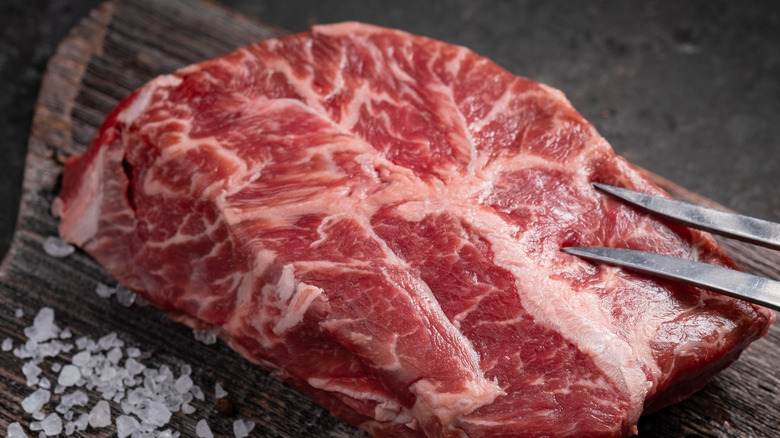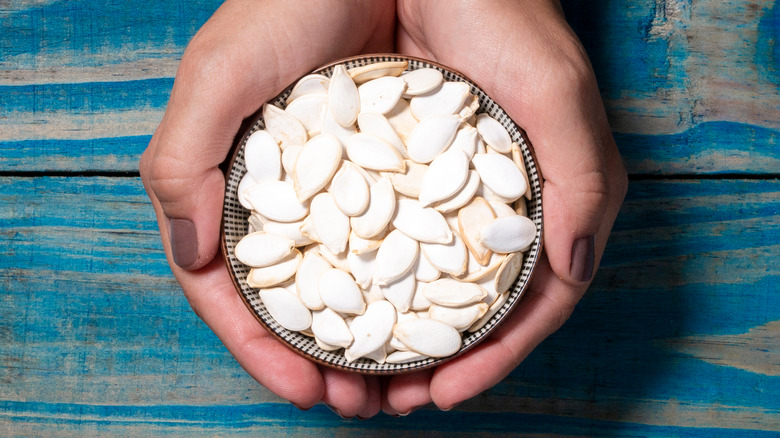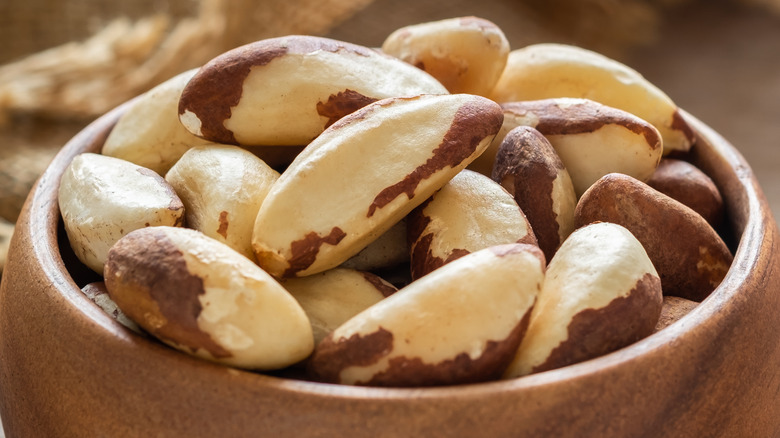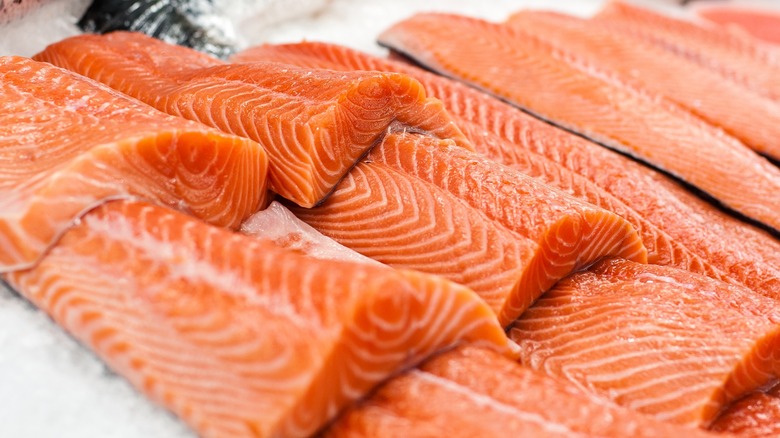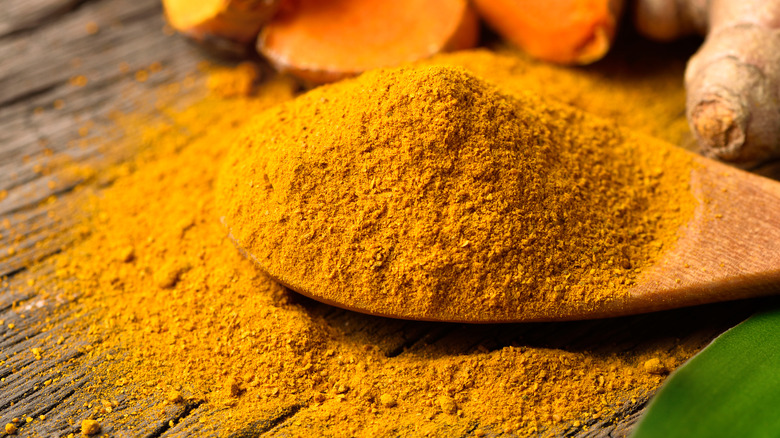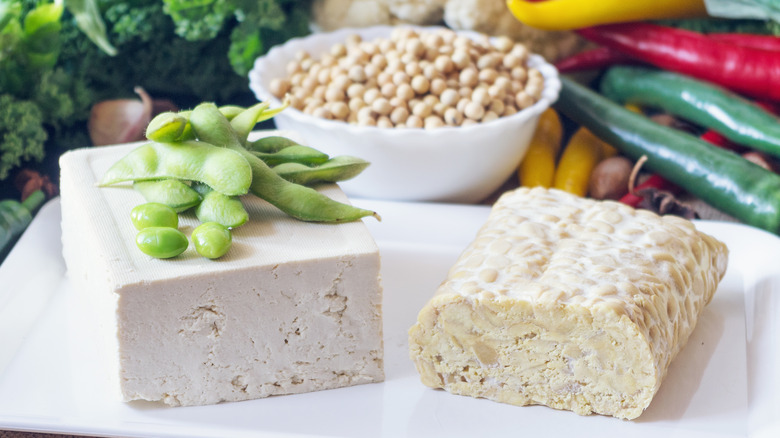7 Foods To Eat And 7 To Avoid If You Have Graves' Disease
Graves' disease is an autoimmune condition that affects your thyroid, the butterfly-shaped gland in the front of your neck. According to the American Thyroid Association, the disorder causes the majority of hyperthyroidism cases. When you have Graves' disease, your immune system attacks your thyroid because it thinks it needs more hormones than it really does. This results in a lot of uncomfortable symptoms, including trembling limbs, anxiety, and muscle weakness, says WebMD. Nobody knows what exactly activates Graves' disease, though it's believed to be genetic and environmentally related. It also affects more women than men, according to the Mayo Clinic.
What does any of this have to do with your diet? Doctors have a number of methods to medically treat Graves' disease, but an important way to manage the symptoms is by eating nutritious foods that don't trigger an overreaction of the immune system, explains endocrinologist Dr. Robert M. Sargis (via EndocrineWeb). So with that, let's dive in to see the foods you should and shouldn't eat to soothe your Graves' disease symptoms.
Eat: Berries
Antioxidant-packed foods help keep your immune system humming along. How? By neutralizing free radicals, or as Harvard Health explains it, "They act as a natural 'off' switch." And when you have Graves' disease, a strong, working immune system is key to keeping symptoms at bay.
So adding a lot of natural sources of antioxidants to your daily meals is a crucial first step toward improving your overall health. One easy addition to everyday meals is berries — they are a major source of antioxidants! Think blueberries, blackberries, raspberries, strawberries, or even cranberries, suggests Michigan State University. But don't stop there. Tomatoes are on the list too, as are bell peppers and squash. Sounds like the makings for a delicious dinnertime side dish.
The health benefits of blueberries alone are pretty amazing. "Blueberries are believed to have one of the highest antioxidant levels of all common fruits and vegetables," Healthline reports.
Avoid: Red meat
Limiting red meat from your diet may help reduce hyperthyroidism symptoms, according to the Icahn School of Medicine at Mount Sinai. Red meat is high in saturated fat, and studies show it contributes to many different serious conditions, including cancer and Graves' disease. So reducing the amount of red meat in your meals (along with processed meats) is a great start when revamping your diet.
"If you want to battle inflammation, start by taking a look in your kitchen. And when you make your grocery list, add less inflammatory foods and more anti-inflammatory foods like vegetables, fruits, nuts, beans, seeds, and fatty fish," recommends Cleveland Clinic registered dietitian nutritionist Erin Coates.
So do you need to ultimately eliminate red meat? The Mayo Clinic says no, but advises that if you normally go pretty heavy on the steaks, chops, and burgers, then just cut back and make lighter choices a few days a week.
Eat: Leafy greens
When you have Graves' disease — the most common cause of an overactive thyroid — it can make it hard for your body to absorb enough calcium, explains Healthline. Calcium builds strong, healthy bones, says the Harvard T.H. Chan School of Public Health. Without enough of this mineral, you may be looking at a future of weak and brittle bones.
Most people would turn to dairy, such as milk, cheese, or yogurt, for calcium. However, the better choice for those with Graves' disease is eating dark leafy greens. You may not realize it, but spinach, kale, and collard greens are absolutely loaded with calcium, says Healthline. But why not dairy? According to a study in the journal Nutrients, dairy often has significant concentrations of iodine — and that's not ideal for a thyroid that's already on overdrive.
"Almost every cell in your body uses calcium in some way," says registered dietitian nutritionist Carissa Galloway. "Not only is it essential for making strong teeth and bones [but] calcium is [also] used by our nervous system and regulates muscle contraction," she told Well+Good.
Avoid: Fast foods
Sinking your teeth into juicy fried chicken or deep-fried mozzarella sticks sure can be tempting, but it's kind of a no-brainer to limit fast foods from any diet. These foods are high in preservatives and saturated fats, and fried food in particular causes inflammation and oxidative stress on your cells, warns The Healthy. Since inflammation aggravates symptoms of Graves' disease, experts advise cutting back on these highly processed commercially prepared foods from meals, per Healthgrades.
Chronic inflammation does damage to your DNA and increases the likelihood of many diseases, reveals the National Cancer Institute. In a review published in Health Promotion Perspectives, the evidence was clear that fast food, in general, has an adverse effect on our bodies.
"Unfortunately, many of the nutrients that are essential for proper thyroid function are not made by the body and therefore need to be consumed in our diet," says Ashley Shaw, a registered dietitian nutritionist (via The Beet). "Adequate levels of these nutrients allow the thyroid to produce and secrete hormones that are invaluable to normal body processes."
Eat: Pumpkin seeds
Getting adequate magnesium in your diet is important for everyone, especially if you suffer from certain medical conditions such as Grave's disease. This important mineral that's vital to our bodies helps regulate muscle and nerve function, normalize blood pressure, and support the immune system, reports Medical News Today. And without enough magnesium, your Graves' disease symptoms could worsen, warns Healthline.
Fortunately, magnesium is in a lot of foods that many of us like to eat, including pumpkin seeds, cashews, and peanuts. By just sprinkling some seeds or nuts on your favorite salad, soup, or entree, you can amp up its taste, as well as increase its nutritional value.
Of course, you can always reach for a magnesium supplement, but you'll reap the benefits of extra nutrition and fiber by focusing on a well-rounded diet instead of a mass-produced pill, reveals WebMD. "[You'll get] so many fantastic nutrients, such as vitamins, other minerals, and phytonutrients," says Cleveland Clinic registered dietitian Anna Taylor. Phytonutrients have antioxidant and anti-inflammatory properties that are amazing for health.
Avoid: Sushi
You might wonder how sushi could possibly be on the avoid list when it's a healthy food. When you're battling Graves' disease, though, some meal choices just have to take a back seat.
Nori-wrapped sushi, though loaded with awesome cancer-fighting omega-3 fatty acids, essential vitamins, and iron, is also very high in iodine, according to Livestrong. In fact, WebMD reports that a 10-gram serving of nori, which is a type of dried seaweed, contains more than 1.5 times the daily minimum requirement.
Fish is a source of iodine, an essential micronutrient, especially saltwater fish such as cod, shrimp, tuna, and scallops. Even the imitation crabmeat used by many Japanese restaurants in sushi rolls is iodine-rich, made of a mixture of pollock (a member of the cod family), according to Medical News Today. Combine it with a nori wrap, and you've got yourself a whole lot of iodine in one dish.
Eat: Brazil nuts
Selenium is essential to thyroid function. It's a powerful antioxidant that protects the body against cell damage and chronic conditions, according to the Harvard T.H. Chan School of Public Health. We only need a very small amount of this trace mineral for thyroid health, and in most areas of the world, getting what we need is obtained easily from food sources. However, for people with certain disorders, including Graves' disease, the body may have trouble absorbing selenium, so more is needed.
A rich source of dietary selenium can be found in Brazil nuts. By eating just six to eight nuts, you'll get an impressive 544 micrograms of this important mineral. (55 micrograms per day is the daily recommendation for adults, per Healthline). Other food sources for selenium include fish, meat, eggs, and enriched grains.
"Selenium is well-known to protect the thyroid," says Margaret Rayman, Ph.D., professor of nutritional medicine at the University of Surrey, Guildford, UK and co-author of a related study in China (via EndocrineWeb). "We have shown [in our research] that low selenium is associated with an increased risk of thyroid disease."
Avoid: Caffeinated drinks
Too much caffeine can leave even the best of us a little jittery at times. If you have Graves' disease, though, your system is already in overdrive from a metabolism that's out of whack by an overactive thyroid. So adding a lot of caffeine to the fire is just fueling a mountain of unwanted symptoms, says Premier Health.
"For someone who has significant clinical hyperthyroidism, it's as if they are already running a treadmill every day, even in their sleep," says endocrinologist Dr. Christian Nasr of the University of Arizona College of Medicine (via the Cleveland Clinic).
The caffeine content in coffee, soda, energy drinks, and tea magnifies Graves' disease symptoms, which can include everything from a racing heart and sleepless nights to sweaty palms. Basically, hyperthyroidism speeds up your metabolism. Does this mean you need to cut out caffeine completely? No, not necessarily, but drinking caffeinated beverages in moderation would be a great plan of action, according to EndocrineWeb – or at least, switching to decaf.
Eat: Salmon
Although salmon contains iodine, which is generally something you want to limit if you have an overactive thyroid, Medical News Today points out that this fish is also a fantastic source of dietary vitamin D. One 3-ounce serving has 570 IU (international units) — nearly the total recommended daily allowance, says the Mayo Clinic.
Vitamin D is a hormone that's essential for our immune system, muscle function, and bone health, explains the British Thyroid Foundation. It also helps our bodies absorb calcium, which is especially important because you excrete calcium faster than normal when you have Graves' disease (via MedicineNet). Although we can make vitamin D ourselves by soaking up ultraviolet light from the sun through our skin, a more reliable — and safer — year-round method is to take a supplement or to get it through food. Incorporating salmon — especially the more nutritious wild-caught salmon — into the diet is one way to start (per Boston University).
Avoid: Pasta
Research published in the journal Autoimmunity Reviews shows that Graves' disease is sometimes accompanied by one or more other autoimmune conditions, including celiac disease. As a result of this link to gluten intolerance, medical professionals may recommend limiting pasta and other gluten-heavy foods from your plate, per Everyday Health.
Gluten is a collection of different proteins, explains Healthline. Wheat, barley, rye, brewer's yeast, and malt are all sources of gluten. WebMD reports that common foods with gluten range from bread and baked goods (waffles, pies, pancakes) to cereal, crackers, pasta, and beer. So unless they're labeled gluten-free, you may need to avoid them if you have Graves' disease.
A key thing to remember is that only some people with an overactive thyroid will have a sensitivity to gluten. But it's crucial to have it tested to find out if you do. "Though it's not entirely clear whether a gluten-free diet can help treat thyroid disease on its own, if you have been diagnosed with celiac disease, it's important to maintain a strict gluten-free diet to keep symptoms at bay," reports Health.
Eat: Turmeric
Turmeric is one of many fragrant spices that make up the mixture of spices in curry, a common spice blend in South Asian cuisines. The compound that gives turmeric its bright yellow color is curcumin, known for its strong antioxidative and anti-inflammatory properties, reveals Healthline.
A study in the Indian Journal of Endocrinology and Metabolism demonstrated a link between turmeric and green chilis with the reduction of goiter, which is the enlargement of the thyroid, per WebMD.
But it's not just turmeric or green chilis that get a glowing report for easing chronic inflammation and other symptoms of Graves' disease. A wide range of natural remedies is available in your garden or local grocery store. "A great way for people to eat their way to improving inflammatory issues is to include anti-inflammatory herbs and seeds such as ginger, turmeric, guggul, ashwagandha, mustard seeds, and holy basil," says nutritionist Poornima Sharma, Ph.D, a health coach at Art of Living Retreat Center (via Eat This, Not That!).
Avoid: Tofu and soy milk
For some people, soy products just aren't a good match for their system. If you regularly feel uncomfortably bloated or constipated after feasting on tofu stir-fries or a night on the town filled with soy milk lattes, then it's a sign that soy could be triggering your immune defenses, according to Food Allergy Research & Education (FARE). These are inflammatory responses that will aggravate hyperthyroidism symptoms.
Edamame, tofu, tempeh, miso, and soy nuts, per UCSF Health, are all in the soy family. Soy is a nutritious food that's rich in protein. However, if you have hyperthyroidism, it's recommended that you eat soy sparingly or avoid it altogether to minimize flares of Graves' disease symptoms, according to Fluoptics. Likewise, if you're receiving radioactive uptake treatments, the American Thyroid Association warns that soy may also suppress the thyroid's ability to fully absorb the radioactive material, hindering the treatment's success.
Eat: Dates
If you've ever felt short of breath or irritable (or if you've tested positive for anemia), your low iron level may be due to an overactive thyroid from Graves' disease. Research published in the journal Clinical Endocrinology shows that the hyperthyroidism that's associated with Graves' disease is linked to low iron levels. If you have this autoimmune condition, it's important to get your iron levels back up within normal range, and the best way to do it is with food.
Dates are packed with iron and make an excellent choice for an energy boost, advises WebMD. Since they have a high sugar content, it's important to only eat dates in moderation. In addition to dates, other non-meat sources of iron include figs and raisins, as well as many types of seeds and nuts (via Cleveland Clinic).
"The more iron you can get from vegetables and non-meat products, the better, as some research suggests decreasing your meat and poultry intake can improve hyperthyroid symptoms," says Kelly Kennedy, a registered dietitian with Everyday Health.
Avoid: Cakes, cookies, and added sugars
Too much sugar causes inflammation in the body, warns Harvard Health. So laying off cakes, cookies, donuts, and other sugary delights is highly advised by the experts, the Icahn School of Medicine at Mount Sinai says.
Sugar that's naturally occurring in food is not a problem because it's digested slowly. What is a concern, according to the American Heart Association, is all the added sugar. Simply put, the American diet is swimming in it, with adults consuming an average of 77 grams of sugar per day — that's 60 pounds of added sugar in a year! The stats for children are even worse, as they consume a whopping 81 grams per day (or 65 pounds annually).
Not only is there no nutritional benefit to all the excess sugar, but these types of high-calorie, high-sugar foods also lead to weight gain and spike your blood sugar, all of which result in inflammation. And as we know, inflammation aggravates the symptoms of hyperthyroidism caused by Graves' disease. "Reducing the intake of ultra-processed foods and added sugars may help improve symptoms, manage weight, and boost overall well-being," according to Medical News Today.



